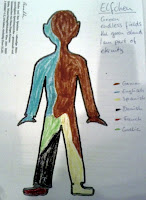"Give a water-tight definition for citizenship!"
I guess for a candidate in a quiz this question would be impossible to answer. There is not one single unchallenged definition for "citizenship". It is an essentially contested concept but what different approaches have in common is that citizenship is more than just knowing about rights and duties. It is also about identity and feelings of belonging.
But why is that important for us? I think that was the question most of us had in mind when we went to the citizenship and globalisation course on Friday. The answers to that questions were not easy to find. I will just try to summarize at least some of the attempts to find a solution:
During the last 25 years the EU had to face huge waves of immigrants coming to the European countries. This in combination with a decreasing knowledge about democracy among young people lead to a widespread discourse about the topic. In some countries this academic discourse resulted in the change of educational curricula or in the development of new school subjects. Central aims were in all cases to arouse an interest in the students to deal with the topic of citizenship. In the first place democratic values should be protected and no longer be seen as perpetually given. Democracy is a fragile concept and it is put to the test these days by migration, individualization and globalization. It implies not only a passive (signing a document, possessing a passport, ...) but also an active (raise one's voice, take part in society) role. As future teachers it will be our task to continue that discourse.
I guess for a candidate in a quiz this question would be impossible to answer. There is not one single unchallenged definition for "citizenship". It is an essentially contested concept but what different approaches have in common is that citizenship is more than just knowing about rights and duties. It is also about identity and feelings of belonging.
But why is that important for us? I think that was the question most of us had in mind when we went to the citizenship and globalisation course on Friday. The answers to that questions were not easy to find. I will just try to summarize at least some of the attempts to find a solution:
During the last 25 years the EU had to face huge waves of immigrants coming to the European countries. This in combination with a decreasing knowledge about democracy among young people lead to a widespread discourse about the topic. In some countries this academic discourse resulted in the change of educational curricula or in the development of new school subjects. Central aims were in all cases to arouse an interest in the students to deal with the topic of citizenship. In the first place democratic values should be protected and no longer be seen as perpetually given. Democracy is a fragile concept and it is put to the test these days by migration, individualization and globalization. It implies not only a passive (signing a document, possessing a passport, ...) but also an active (raise one's voice, take part in society) role. As future teachers it will be our task to continue that discourse.


